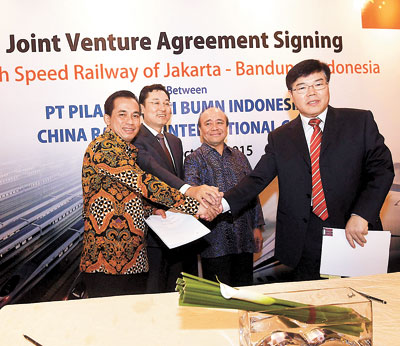|

OFFICIALS from China and an Indonesian consortium signed an agreement Friday to build the first high-speed rail line in Indonesia after Japan lost in the bidding late last month.
The estimated US$5.5 billion high-profile railway deal was signed by China Railway International Co. Ltd. Chairman Yang Zhongmin and Dwi Windarto, the president director of a consortium of Indonesian state companies, PT Pilar Sinergi BUMN Indonesia.
China had been expected to secure the project in Southeast Asia’s largest economy after Indonesian officials rejected Japan’s requirement for a government guarantee of loans late last month.
Regional rivals China and Japan had been competing to construct the 150-kilometer Jakarta to Bandung high-speed line as part of 750 kilometers of new rail planned for Indonesia.
The Indonesian state-owned companies forming the joint venture are construction company PT Wijaya Karya, railway operator PT Kereta Api Indonesia, toll-road builder PT Jasa Marga, and plantation company PT Perkebunan Nusantara VIII.
The joint venture’s chairman Sahala Lumban Gaol said the construction is expected to begin early next year and completed in 2018. The trains are to start operating in early 2019 with eight stops, speeds of 250 kilometers an hour, and a fare of about US$16.
The existing regular trains to Bandung, the capital of West Java province, take about three hours and cost about US$8.
China will hold 40 percent of the venture and the State-owned China Development Bank is to finance 75 percent of the project.
“We stand ready to work with Indonesia to ensure the quality and safety of the project,” Yang told reporters. “We hold our commitment strongly since the beginning.”
“This is a brand new episode in Indonesia, particularly in transportation project as it will further boost economic activities in areas along the corridor served by the high-speed train that eventually contribute to the national economic growth,” Sahala said.
The railway is the first transportation project in the country conducted solely on business basis and without any fund from government’s budget.
Sahala also expected the Indonesia-China joint venture to expand its service to similar projects in Southeast Asia and the Middle East in the future.
(SD-Agencies)
|

